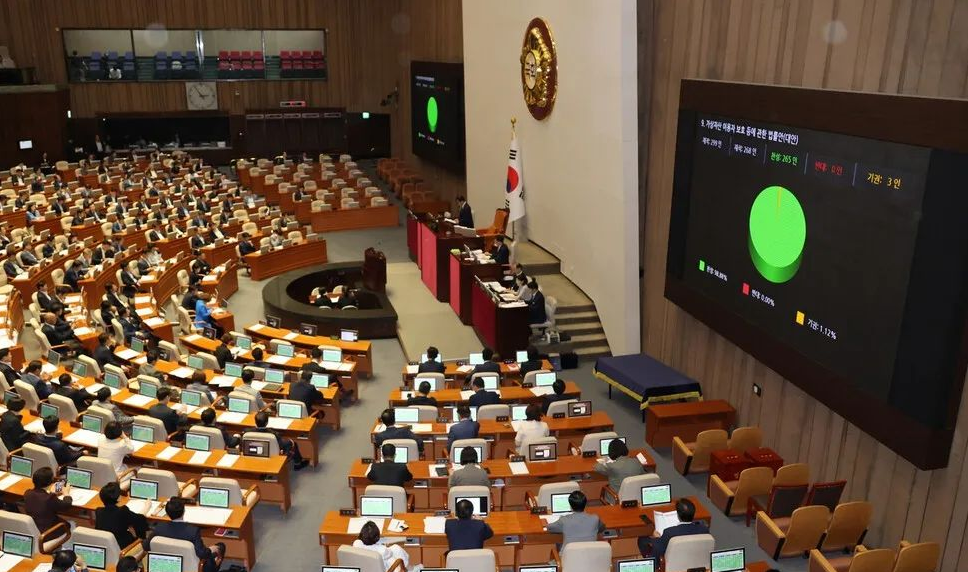South Korea blockchain enters fast lane: SM, Kakao, Samsung, LG and other giants ALL IN
In mid-September, SM, one of the three major entertainment companies in South Korea, announced its “currency” plan, which detonated the “coin circle” and “rice circle”.
At this time, the mutual chain pulse observation, the Korean giant enterprise in the field of blockchain development, is far more than the SM family.
On September 3, South Korean Internet giant Kakao announced that its cryptocurrency KLAY will go online at the end of September; on September 5, Samsung released a built-in blockchain wallet that can access DApp smartphones; September 9 LG also announced that it will launch a blockchain-friendly smartphone; on September 11, South Korea's fourth largest mobile operator, Union Mobile, announced the launch of the ELYNET blockchain project, which will launch the accompanying token ELYX… …
Not more than half of the September, South Korea's Internet, communications, entertainment giants have launched their own plans to issue tokens.
- EOS "go to the threshold", can it be red again?
- Blockchain industry will be more, more meals, but I prefer Babbitt | Babbitt Wuzhen Conference
- "The enemy" Bakkt is about to debut, CME bitcoin futures "the throne is unstable"?
Looking back at September 2017, the Korea Financial Services Commission (FSC) said it banned all forms of token financing (ICO), and South Korea became the second country to stop ICO after China. Subsequently, the ban was officially lifted in June 2018, but the ICO still faces more stringent regulations, and the issuance of tokens is greatly limited.
After two years of circulation, Korean giant companies have begun to build blockchain industry from the perspective of token issuance, and gradually accelerate the development of blockchain.
At the same time, I do not know whether it is affected by the layout of large enterprises, and the Korean public has paid more attention to the blockchain. Mutual chain pulse observation of Google Trends data, in the last week's search fever, South Korea has become the world's "blockchain" search hottest countries.
In the second half of 2019, it will become a key node for the rapid development of the Korean blockchain.
At that time, the "September ban" at this time "the token boom"
In fact, South Korea had a more positive attitude towards blockchain and bitcoin before the release of the “ICO ban” in September 2017. The Korean public is also keen on blockchain and digital currency, according to Sohu.com’s 2018 report. The total population of South Korea is about 50 million, and the number of virtual currency investors is 3.5-400 million, accounting for 8% of the national population.
In fact, in the case of the ban on the use of ICO, tokens representing the underlying fiat currency and tokens for highly guided reward schemes are developable and within the scope of the law.
Therefore, in the year after the ban was issued and three months after the ban, South Korea’s largest Internet service company, NAVER, began offering "LINK CHAIN" and virtual currency for the platform through its subsidiary LINE on September 4, 2018. "Link". But its main face is LINE's 80 million users in Japan.
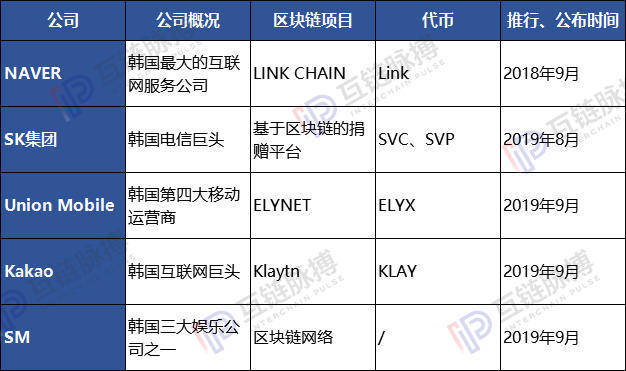
Two years after the ban was issued, more recently, more Korean giants began to promote the token issuance program and targeted Korean users.
In August 2019, South Korea's telecom giant SK Group (the third largest chaebol after Samsung and Hyundai Motor) will create a blockchain-based donation platform that will use Ripple's Xcurrent solution and will be on the platform. Two new tokens are issued. Among them, the SVC token will be exchanged for the Korean won at a price of 1:1 for actual donation; the SVP token will be distributed as compensation to the person using the platform.
In September 2019, South Korea's fourth largest mobile operator, Union Mobile, announced the launch of a blockchain project called ELYNET. The project aims to increase the efficiency of telecommunications for users who rely on a single operator to provide telecommunications services using blockchain technology. The platform will introduce the accompanying token ELYX: When users connect to the communication network via ELYNET's own operating system, they can purchase data through ELYX and enjoy free mobile data communication anywhere in the world without roaming charges or contracts.
In September 2019, Korean Internet giant Kakao announced that its cryptocurrency KLAY will be launched on the Upbit exchange at the end of September. KLAY is the token of the public chain Klaytn developed by Kakao blockchain company Ground X. Upbit Exchange is also one of Kakao's subsidiaries, Dunamu, which is one of the largest digital currency exchanges in Korea.
According to Kakao, the platform will issue KLAY to users based on the corresponding reward system. Kakao also plans to integrate strong entertainment services such as Kakao Games into the Klaytn public chain, trying to create more usage scenarios for KLAY. Correspondingly, KLAY will also cover financial, travel, social, gaming and other scenarios, and will be open to tens of millions of users connected by Kakao.
Also in September, the director of the CTAI Lab of the SM company's technical department said that they are discussing the development of a blockchain network with a joint venture company that operates the blockchain business. SM will be discussing the proposal to issue its own cryptocurrency directly, through cryptocurrency. Investing in artists' work, allowing fans to participate more in the entertainment ecosystem and using blockchain technology to solve the inefficient billing and payment problems of the current entertainment industry.
From this point of view, the action of Korean giant companies to launch tokens seems to have changed from the fire of the stars to the trend of the original.
Block spurs of Korean giants
However, before the formation of the Sparks, it is always inevitable that giants in the fields of finance, technology and so on will take the lead in setting up the banner of blockchain development, and the competition between these giants is inevitable.
Inter-chain pulse observation of the Korean giants in the field of blockchain competition: starting from the technology, respectively, the force of the blockchain mobile phone has the old rivals Samsung and LG; the communication giants SK and KT are also in the layout of the blockchain; Bank and In the financial sector, there are Shinhan Financial Group and Agricultural Cooperative Bank.
1. Technology field: Samsung and LG
As one of Korea's big chaebols, Samsung is keen on multiple expansion. As early as 2015, it has begun to test the water blockchain investment. In 2016, Samsung SDS, the IT subsidiary of Samsung Group, cooperated with blockchain companies Blocko, Korea Customs, Bank of Korea, ABN AMRO, and other companies in the fields of Internet of Things, finance, and certification.
After entering 2019, Samsung has accelerated the pace of blockchain development.
In May news, Samsung’s smartphone will have cryptocurrency and blockchain capabilities;
In July, Samsung reported that Samsung launched a new beta version of the Ethereum Blockchain Software Development Kit (SDK), which makes it easier for developers to build DApps and other mobile blockchain projects on Galaxy smartphones;
In August, Samsung added bitcoin support to its Blockchain Keystore SDK (software development kit), which means that in the future Samsung users can use Bitcoin in the app through the secure storage hardware of the company's devices;
In September, Samsung launched a Galaxy Note 10 phone called "Klaytn Phone", which has a blockchain application and a cryptocurrency wallet and six blockchain apps. People who buy mobile phones can also Get a certain amount of digital currency Klay (Klay is Kakao's Klaytn platform token).
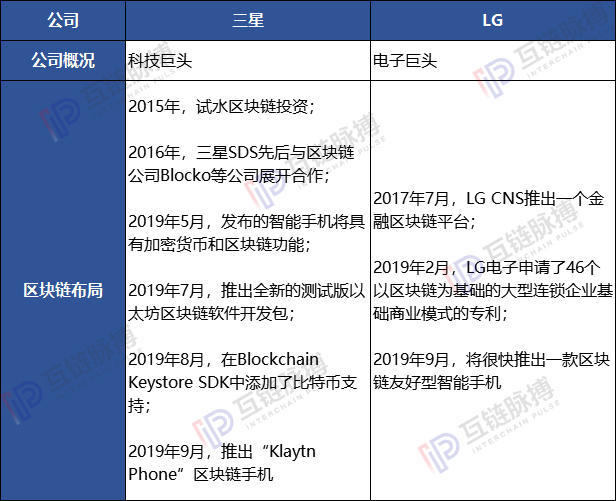
Just after Samsung introduced the blockchain phone, South Korean electronics giant LG announced that they will soon launch a blockchain-friendly smartphone. The move seems to directly blew the horn of the battle between the two giant blockchain smartphones.
Prior to this, LG is also actively paving the way for blockchain development.
In July 2017, LG CNS, a subsidiary of LG, which is responsible for information technology, began to focus on developing blockchain business and providing related services. According to reports, LG CNS launched a financial blockchain platform based on Corda.
In February 2019, LG Electronics applied for 46 patents on the basic business model of large chain enterprises based on blockchain, and strengthened its exploration in the field of digital finance.
Second, the communication field: SK and KT
Different from the competition between Samsung and LG for the Maimang, in the field of communication, SK and KT are separately developing their own blockchain development direction, and the fields involved are more diverse.
SK is Korea's largest mobile communications company. In the past August, it said it would create a blockchain-based donation platform and issue two new tokens on the platform.
Prior to this, SK has also begun to focus on the blockchain. In July 2019, SK invested in a fund operated by blockchain software company ConsenSys. In the same month, SK and its consortium members launched an enterprise blockchain platform called STONledger. One of the possible applications in development is to allow it in the district. Register a driver's license on the blockchain to reduce the amount of fraud caused by unauthorized drivers.
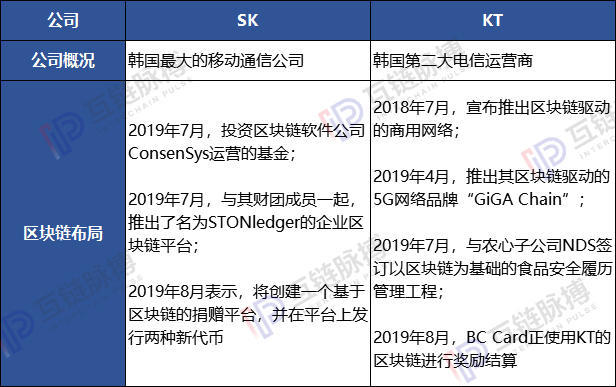
As the second largest telecom operator in Korea, KT has been an early promoter and supporter of blockchain technology.
In July 2018, KT announced the launch of a blockchain-driven commercial network; in April 2019, KT launched its blockchain-driven 5G network brand “GiGA Chain”; in July 2019, KT and Korean food producers NDS's subsidiary, NDS, has signed a blockchain-based food safety history management project to enable retailers, farmers and distributors to maintain a transparent supply chain. In August, South Korea's largest payment processor, BC Card, said Use KT's blockchain for reward settlement.
Third, the financial sector: Shinhan Group and Agricultural Cooperative Bank
At the same time, the inter-chain pulse is based on the disclosed information. Two of the nine largest banks in Korea have explored the blockchain.
Shinhan Financial Group is one of the largest financial groups in Korea, and its Shinhan Bank is the second largest commercial bank in Korea.
In May 2019, Shinhan Bank launched a blockchain loan platform and integrated blockchain technology into financial services and internal agreement management to improve bank productivity, which is the first time South Korea introduced such systems.
In August 2019, Shinhan Financial Investment Group, a subsidiary of Shinhan Financial Group, said it would introduce blockchain P2P stock lending services, allowing individual users and counterparties to achieve peer-to-peer securities lending and lending without the need for an intermediary.
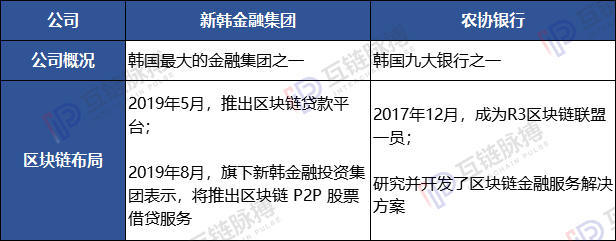
Nonghyup Bank was involved earlier, and in December 2017 it was announced to be a member of the R3 Blockchain Alliance. An official at Nonghyup Bank said: "We will get more technical support by joining the R3 blockchain alliance and apply it to various departments of the bank, such as finance and economics." It is also reported that the bank is studying And developed a blockchain financial services solution.
The company's layout is becoming more and more systematic, and the blockchain industry is more diverse.
In the process of developing blockchains, Korean giants compete with each other, but at the same time they will work together to explore new forms of cooperation and development.
For example, in July of this year, financial services company Keb hana bank, Woori Bank, Korea Securities Information Corporation, South Korea SK Telecom, Korea Telecom (KT), South Korean mobile operator LG Uplus and technology giant Samsung formed a business partnership. And said that the blockchain-based mobile identification system will be launched in 2020. The service is designed to allow users to store personal information and use it at will, such as a resident ID number or bank account number.
Recently, Samsung has cooperated with GroundX, a blockchain company of Korean social giant Kakao. When users purchase Samsung's new blockchain mobile phone, they can get a certain amount of digital currency Klay, which is Kakao's Klaytn platform token.
In the meantime, it is worth noting that while Kakao is working with other giants to promote the development of the blockchain, it is also building its own complete blockchain ecosystem.
The tokens issued by Kakao link to its own blockchain ecosystem. In October 2017, Kakao's subsidiary, Dunamu, launched Upbit, officially entered the cryptocurrency market, and quickly became one of the top 5 cryptocurrency exchanges in Korea. In March 2018, Kakao established the block chain subsidiary Ground X to develop the blockchain public chain Klaytn, which is the token of the Klaytn public chain. In June 2019, the Klaytn public chain was officially launched. In August, Kakao announced that it will launch the encrypted wallet "Klip" (developed by Kakao's blockchain company Ground X) in the second half of the year, and said it is developing another three encryption wallets.
From exchanges, to public chains, to tokens, to encrypted wallets, Kakao seems to have built a complete blockchain framework.
While the individual is getting better and better, the interchain pulse observes another trend. In 2019, the Korean corporate giants in the blockchain field were not only limited to the fields of finance, technology, and communication, but have entered the automotive and entertainment fields.
In April 2019, Hyundai-Kia Motors said it would use blockchain technology to prevent hackers in order to prevent users from having security issues such as hackers in uploading settings to the server.
In June, Hyun Technology, a blockchain company supported by Hyundai Hyundai, established a strategic partnership with blockchain startup CasperLabs to jointly research and develop consensus mechanisms and seamless integration between Hdac and CasperLabs blockchains.
In July, Hyundai Motor Group, a subsidiary of Hyundai Motor Group, announced a partnership with the Korea Baogao Group, which specializes in BaaS providers, and plans to jointly develop an internal platform for the auto giant. Modern uses blockchains to protect vehicle ownership, allowing for the tracking of confidential information such as vehicle mileage, service history and age.
Later, it was SM's “issuing the currency” plan, which brought blockchain technology into the entertainment field and further pushed the blockchain technology to the public.
With the development of Korean giant companies in a more systematic and diversified direction, the Korean blockchain is welcoming the acceleration of development.
This article is [inter-chain pulse] original, the original link: https://www.blockob.com/posts/info/23608.
Text | Mutual chain pulse · Gold car
We will continue to update Blocking; if you have any questions or suggestions, please contact us!
Was this article helpful?
93 out of 132 found this helpful
Related articles
- Analysis: A Brief Discussion on the Loss of Developers in Ethereum
- Bank of America loves blockchain, and international trade blockchain alliance Marco Polo adds new
- Zuckerberg is still difficult to eliminate regulatory concerns, can Libra kill a bloody road?
- Babbitt column | On-line physical delivery bitcoin futures, can Bakkt detonate the new bull market?
- Buying cryptocurrencies after throwing away $100 million in stock, the former CEO of Overstock called the blockchain to make him safer
- The latest IMF article: The rise of stable currency, the weak currency will face a huge threat
- Fake foreign exchange platform to enter the currency circle: reverse shouting, tampering with data, investors become the biggest victims




